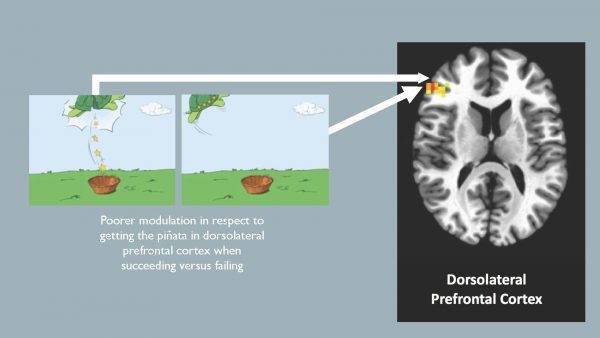Dr. Wiggins, Karen Schwartz, and Maria Kryza-Lacombe of TEND Lab recently published a scientific paper in the Journal of Affective Disorders showing that young children at risk for depression and other mental health problems show a distinct neural profile. TEND Lab researchers, in collaboration with Dr. Lea Dougherty’s group at University of Maryland, examined fMRI data from children who were at high risk because their mothers have depression, while they played a virtual “piñata” game in which they could win (or fail to win) rewards.
Researchers found that children at high risk for mental health problems respond differently to getting (or failing to get) a reward: they are unable to appropriately modulate their activation in brain regions associated with cognitive control and emotion in response to getting and failing to get a reward.
This blunted brain response may reflect that getting rewards may not “feel” as good to children at high risk for depression. Moreover, the inappropriately high brain response to missing rewards may reflect that failure “feels” particularly bad, which could make these children more vulnerable to depression.
TEND Lab members Sophie Bills, Ysabella Panggat, and Karen Schwartz also presented these novel findings in a talk at the SDSU Student Research Symposium.
The TEND Lab plans to continue research with children of mothers to probe what brain profiles lead to depression and other mental health problems, so that in the future this information could be used to prevent depression from developing in the first place.
Wiggins, JL, Schwartz, KTG, Kryza-Lacombe, M, Spechler, PA, Blankenship, SL, Dougherty, L. (in press). Neural Reactivity to Reward in School-Age Offspring of Depressed Mothers. Journal of Affective Disorders. (link to article)


